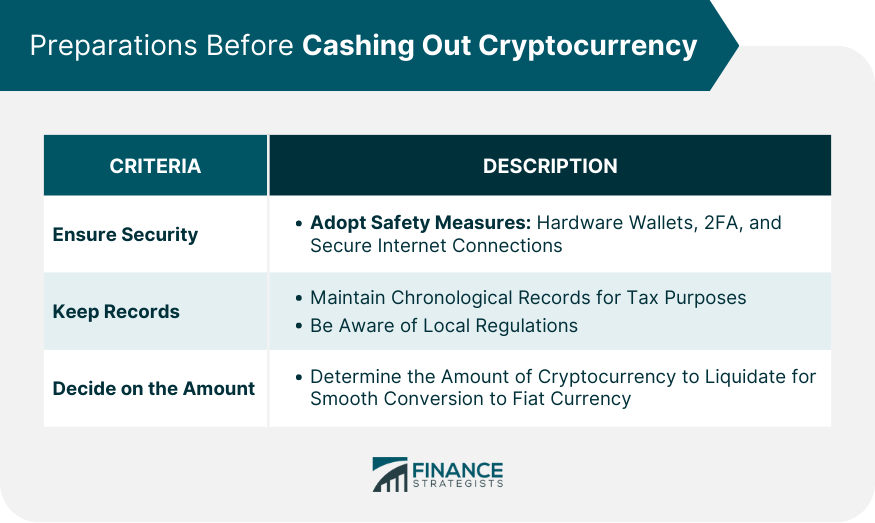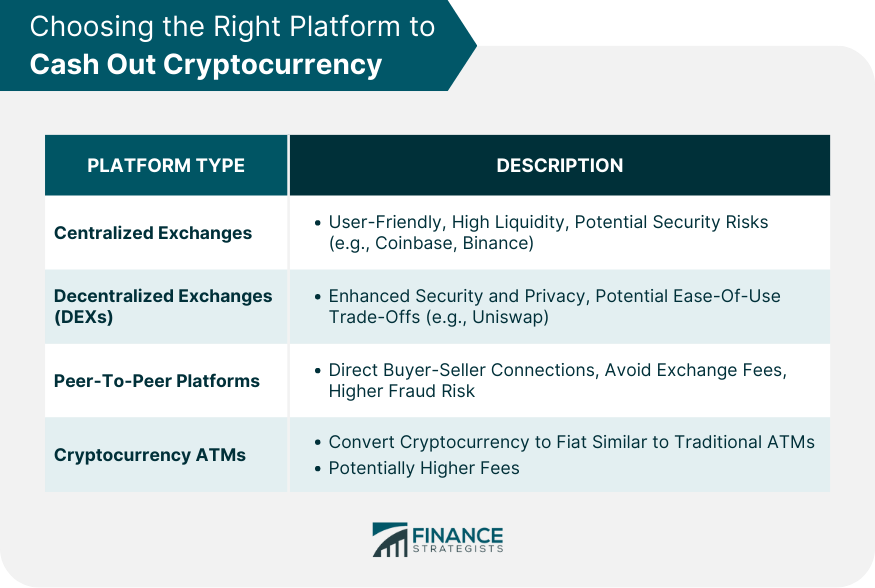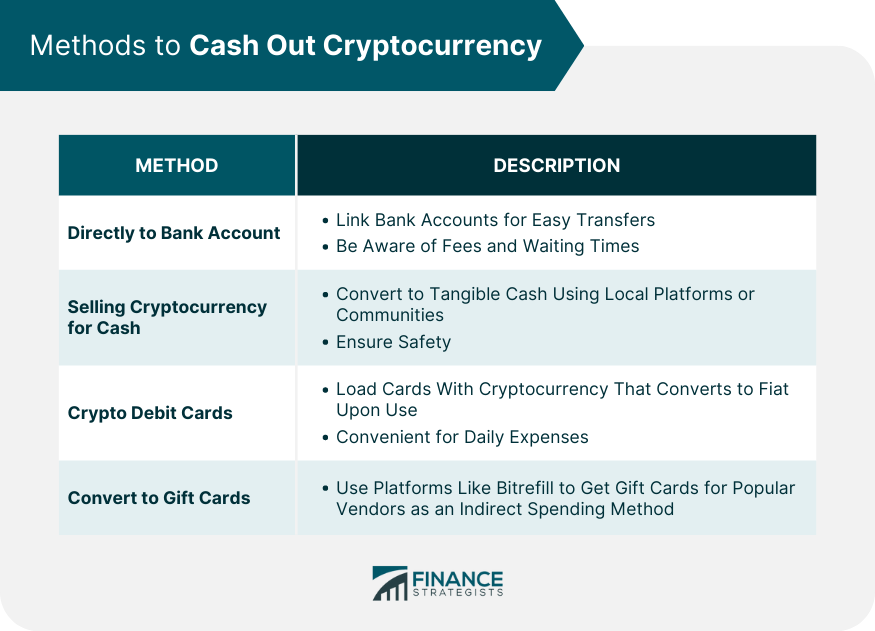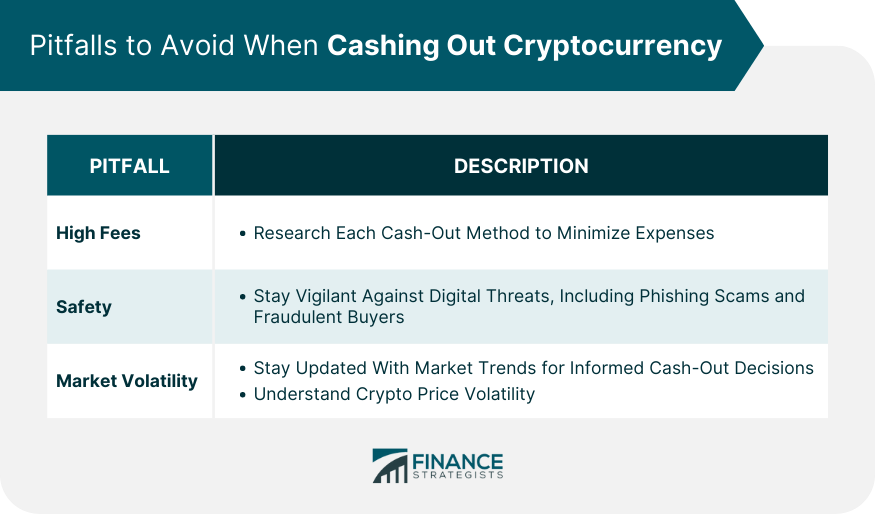Cashing out your cryptocurrency is a straightforward process, though it's essential to proceed with caution and be aware of fees and security measures. Choose a Platform: You'll first need a platform or exchange that allows fiat withdrawals. Examples include Coinbase, Binance, and Kraken. Verify Your Identity: Most platforms require KYC (Know Your Customer) verifications. This step may involve uploading identification documents and waiting for approval. Transfer Your Cryptocurrency: Send your cryptocurrency from your personal wallet to the chosen platform. Ensure the correct address is used to prevent loss. Sell: Once transferred, sell your cryptocurrency for the desired fiat currency (e.g., USD, EUR). Withdraw: After selling, initiate a withdrawal to your bank account or the preferred payment method. The crypto world is not without its threats. Adopting safety measures like using hardware wallets, enabling 2-factor Authentication (2FA), and ensuring secure internet connections can safeguard your assets from potential cyber threats. Maintaining a clear, chronological record of all your cryptocurrency transactions isn't just good practice; it's a necessity, especially for tax purposes. Depending on your country's regulations, you may need to provide a detailed log of your crypto activities. Determine the exact amount of cryptocurrency you wish to liquidate. Whether you're cashing out partial holdings or your entire portfolio, having a clear number in mind aids in a smooth transition to fiat currency. Centralized Exchanges: Platforms like Coinbase, Binance, and Kraken dominate the crypto-to-fiat conversion space. They're user-friendly and often provide higher liquidity, enabling faster transactions. However, their centralized nature can make them targets for hackers. Decentralized Exchanges (DEXs): Unlike their centralized counterparts, DEXs like Uniswap or Sushiswap operate without a central authority. While they offer enhanced security and privacy, they may lack the ease of use and liquidity provided by centralized exchanges. These platforms connect buyers with sellers directly. The benefits include bypassing exchange fees and more control over the transaction terms. Yet, it’s crucial to remain cautious, as the risk of fraud can be higher. Crypto ATMs function similarly to traditional ATMs. Input your cryptocurrency, and receive fiat currency in return. While convenient, they might charge higher fees than other cash-out methods. Many centralized exchanges allow users to link their bank accounts for easy transfers. After selling your crypto on the exchange, you can transfer the fiat directly to your bank. Be mindful of potential fees and waiting times, which can vary by platform and bank. There's a certain allure in tangible, cold, hard cash. If you opt for this, consider local crypto communities or platforms like LocalBitcoins. Always prioritize safety, meeting in public spaces, and ensuring transparent communication with potential buyers. An innovative bridge between the crypto and fiat realms, crypto debit cards allow users to load their cards with cryptocurrency, which gets converted to fiat upon transaction. It's a handy tool for everyday expenses, providing both convenience and utility. Platforms like Bitrefill offer users the chance to convert their cryptocurrency holdings into gift cards for a plethora of popular vendors. This method provides an indirect route to spend your crypto in the mainstream market without needing to convert it to traditional money first. Cryptocurrencies, despite their decentralized nature, aren't immune from the taxman's gaze. When you cash out, you're essentially realizing your gains or losses, which can be subject to capital gains tax. It’s pivotal to understand how these regulations apply to your situation. Missteps can lead to complications, potential legal issues, or financial penalties. Engaging with tax professionals, especially those knowledgeable in cryptocurrency, can save you future headaches. Each cash-out method comes with its own set of fees. Thoroughly researching each avenue can help minimize unnecessary expenses. The digital space has its fair share of pitfalls. From phishing scams to fraudulent buyers, remaining vigilant and skeptical can prevent potential losses. Cryptocurrency prices can be highly volatile. While it’s impossible to predict market movements with absolute certainty, staying updated with market trends can aid in making informed cash-out decisions. Navigating the realm of cryptocurrency conversion demands a blend of caution, awareness, and preparation. Centralized platforms like Coinbase provide user-friendly avenues, while decentralized options offer heightened privacy. For direct peer interaction, Peer-to-Peer platforms are valuable, though they come with heightened fraud risks. While crypto ATMs present convenience, they might levy higher fees. Direct bank transfers, selling for cash, crypto debit cards, and even gift card conversions offer diverse liquidation routes. However, the financial landscape isn't just about cashing out; it's about ensuring security through measures like 2FA and staying tax-compliant to avoid legal repercussions. Vigilance against potential scams and a keen eye on market volatility are also paramount. By blending informed decisions with secure practices, one can seamlessly transition from the digital coin realm to tangible fiat currency.How to Cash Out Your Cryptocurrency: Overview
Preparations Before Cashing Out Cryptocurrency
Ensure Security
Keep Records
Decide on the Amount

Choosing the Right Platform to Cash Out Cryptocurrency
Exchanges
Peer-To-Peer Platforms
Cryptocurrency ATMs

Methods to Cash Out Cryptocurrency
Directly to Bank Account
Selling Cryptocurrency for Cash
Crypto Debit Cards
Convert Cryptocurrency Into Gift Cards

Tax Implications When Cashing Out Cryptocurrency
Pitfalls to Avoid When Cashing Out Cryptocurrency
High Fees
Safety
Market Volatility

Conclusion
How to Cash Out Your Cryptocurrency FAQs
Select a platform based on its security features, fees, liquidity, and user reviews. Centralized exchanges are user-friendly but can have higher fees, while decentralized ones offer more privacy but might lack liquidity.
Yes, many countries treat cryptocurrency gains as taxable income. When you cash out, you may incur capital gains tax. It's essential to consult with a tax professional familiar with cryptocurrency regulations in your region.
Ensure transparency in communication, meet in public places if dealing in person, use platforms with an escrow service, and check buyer/seller reviews to minimize risks.
Yes, cryptocurrency ATMs allow you to convert your digital assets into fiat currency. However, they might have higher transaction fees compared to online platforms.
Crypto debit cards allow you to load them with cryptocurrency. When used for transactions, the crypto is automatically converted to fiat currency, making it a convenient tool for daily expenses.
True Tamplin is a published author, public speaker, CEO of UpDigital, and founder of Finance Strategists.
True is a Certified Educator in Personal Finance (CEPF®), author of The Handy Financial Ratios Guide, a member of the Society for Advancing Business Editing and Writing, contributes to his financial education site, Finance Strategists, and has spoken to various financial communities such as the CFA Institute, as well as university students like his Alma mater, Biola University, where he received a bachelor of science in business and data analytics.
To learn more about True, visit his personal website or view his author profiles on Amazon, Nasdaq and Forbes.











